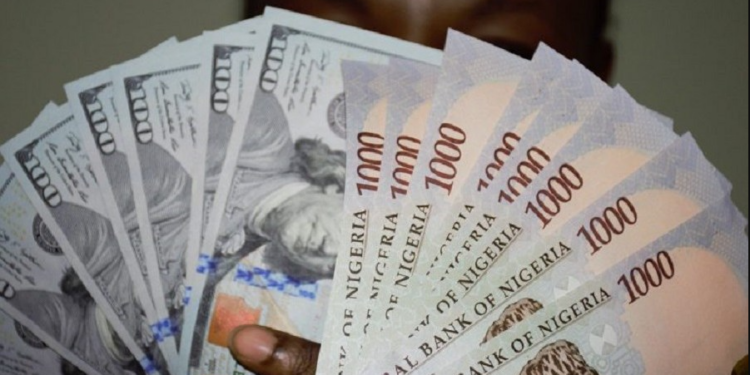The Nigerian naira continued its depreciation against the US dollar at the official foreign exchange market on Thursday, closing at N1,605/$1.
This is according to data published on the Central Bank of Nigeria (CBN) website.
This marks a marginal decline from N1,603/$1 recorded on Wednesday and N1,606/$1 on Tuesday, the first trading day after the Easter holidays.
The slide reflects sustained pressure on the naira amid limited dollar supply and rising demand from importers and other market participants.
In the parallel market, also known as the black market, the exchange rate remained under pressure as the naira exchanged at N1,610/$1 on Thursday.
This represents a slight weakening compared to N1,600/$1 on Wednesday but a mild recovery from N1,615/$1 on Tuesday, according to data gathered by Nairametrics from market sources.
The growing disparity between the official and parallel market rates — now standing at about N5 — shows persistent inefficiencies in the foreign exchange market, despite several recent interventions by the CBN aimed at enhancing liquidity and transparency.
Naira under pressure
Analysts suggest the pressure on the naira may persist in the short term as the country continues to grapple with low oil production levels, reduced foreign inflows, and strong dollar demand, especially from businesses settling obligations incurred during the Easter break.
Market watchers are also keenly observing the impact of the CBN’s recent reforms which are designed to stabilize the currency in the medium to long term.
More insights
At a forum held this week at the Nasdaq MarketSite in New York, the Governor of the CBN, Olayemi Cardoso, assured international investors that the bank’s ongoing reforms are steadily contributing to macroeconomic stability and restoring confidence in Nigeria’s economy.
- Governor Cardoso emphasized the CBN’s “unwavering” commitment to rebuilding trust in the financial system through orthodox monetary policy, increased transparency, and consistency in its operations.
- He highlighted that over the past 18 months, the CBN has introduced a series of reforms aimed at controlling persistently high inflation and improving transparency in the foreign exchange (FX) market.
- As part of its efforts to address inflationary pressures, the CBN raised key benchmark interest rates by 875 basis points to 27.5 percent. Additionally, the central bank injected hundreds of millions of dollars into the FX market to stabilize the naira in recent times.
To further enhance transparency and foster investor confidence, the CBN introduced the FX Code and the Electronic Foreign Exchange Matching Systems (EFEMS).















